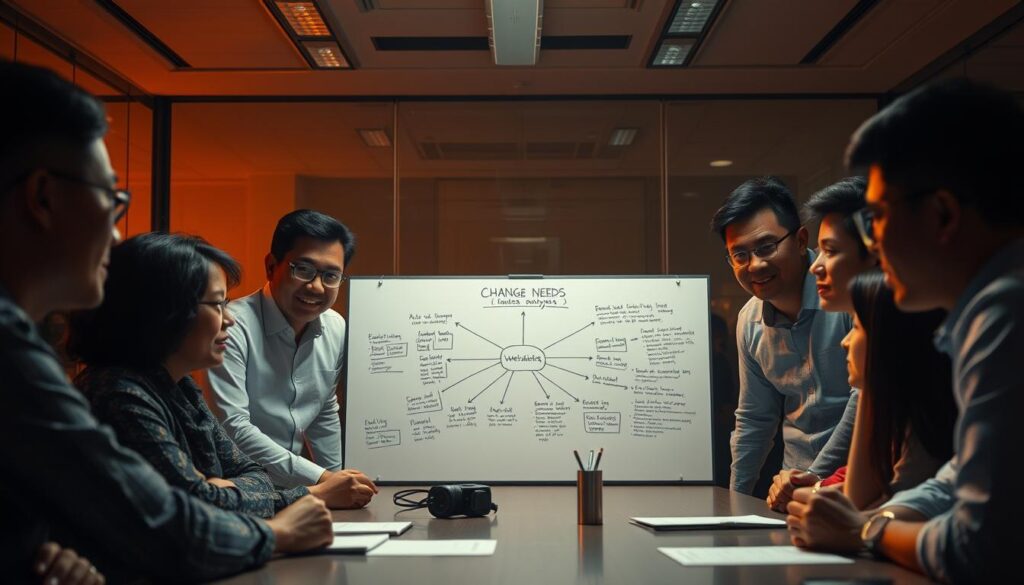Imagine if your company’s success relied on the work of HR professionals. They are the unseen forces that drive change. As markets change fast, HR’s role in transforming organizations is key. They lead in making changes that affect how employees work and the company’s culture.
HR leaders help by keeping communication open, engaging employees, and aligning with company goals. They are crucial in making changes work.
Exploring HR’s evolving role shows they are vital for overcoming challenges. Recognizing HR’s role as change agents helps businesses. It boosts employee engagement and improves performance.
Key Takeaways
- The role of HR professionals is crucial in driving organizational transformation.
- HR change agents facilitate communication and engagement during periods of change.
- Alignment between HR strategies and organizational goals is essential for success.
- Effective HR leadership can significantly impact employee morale and productivity.
- Understanding the dynamics of change can lead to more successful outcomes in organizations.
Introduction to HR as Change Agents
The human resources profession has changed a lot. It’s now more than just administrative work. HR change agents are key in this shift, leading efforts in HR transformation. They help companies adapt to new challenges.
Having HR change agents is very beneficial. They help boost employee engagement and make operations better. They understand the workforce well, helping solve change-related problems.
In today’s business world, HR transformation is crucial. Companies need to keep up with new tech, changing workforce needs, and market shifts. Recognizing the value of HR change agents helps companies succeed in uncertain times.
The Importance of HR Change Agents
HR change agents play a key role in today’s fast-changing business world. They help ensure smooth communication among all stakeholders during big changes. These experts are vital in making sure everyone in the company understands and supports the new direction.
Companies that use HR change agents well see big improvements in their change efforts. Studies show these teams have a 9% higher success rate. HR change agents connect management and employees, solving problems and encouraging teamwork and creativity.
Knowing what motivates employees and understanding the company culture is key to successful change. HR change agents are experts at this. They help overcome resistance to change by really listening to staff and encouraging open talks. This makes employees feel important and part of the change, which is essential for success.

The Evolving Role of HR Professionals
HR leadership roles have changed a lot in recent years. Before, HR mainly handled tasks like hiring and paying employees. Now, they are key partners in changing how companies work. They must keep up with new tech and market changes.
In Asia, many companies have started using new HR practices. These practices focus on keeping employees happy, managing talent, and improving work culture. This shows how HR has grown to include more than just old tasks.
As companies face new challenges and grow, they need HR to think ahead. HR is now more than just doing old tasks. They are important in making companies successful.
Identifying Change Needs within Organizations
It’s key to know exactly what changes are needed in any organization. HR pros start by doing a deep dive into what’s working and what’s not. They look at current systems, processes, and what employees say. This helps them understand the company’s culture and how it works.
HR change agents collect lots of data to figure out what’s needed. They look at how happy employees are and how the culture works. This helps them find out where changes are most needed.
They also think about how changes might affect everyone in the company. By planning ahead, they can make changes that work for everyone. This way, the transition is smoother, and everyone is on the same page.

Developing Effective Change Strategies
Creating a strong change strategy is key for successful transformations in organizations. HR change agents are crucial in this process. They make sure every part of the strategy is well-thought-out. This includes working closely with stakeholders to make the transition smoother.
Collaborating with Stakeholders
Working together with stakeholders is vital for good change strategies. HR teams talk to senior management and department heads to get different views. This builds trust and a shared vision, making everyone more committed to the change.
Getting stakeholders involved early can lead to better and lasting results.
Setting clear objectives and KPIs
It’s important to have clear goals and KPIs for change management success. These metrics help track progress and keep the organization on track. Setting SMART objectives keeps the focus on the transformation.
With defined KPIs, organizations can see how they’re doing and make changes. This shows their dedication to getting better.
Effective Communication and Engagement Strategies
Effective communication is key during organizational change. Clear messages tell employees about new goals and benefits. They also build confidence and lower uncertainty. HR change agents lead these efforts, making sure everyone is on the same page.
They use structured methods to boost employee engagement. This makes everyone feel included during the change.
Utilizing Workshops and Training Sessions
Training workshops are vital for good communication. They let employees ask questions and share concerns. This way, they can really understand new processes.
Getting employees involved in workshops is crucial. It makes them feel heard and valued. Workshops cover important topics like:
- Overview of changes and their implications
- Skills required for new responsibilities
- Strategies for overcoming potential challenges
When employees are part of these workshops, they adapt better to changes. This approach makes their experience better and builds a strong team. Good communication helps reduce resistance, making the transition smoother.

Facilitating Change Implementation
Change needs a clear plan, and HR is key in leading this effort. They help teams work together smoothly. This ensures everyone knows their role and works towards the same goals.
HR does more than just help out. They find and fix problems that could stop change. By keeping an eye on progress, HR can tackle issues early. This makes change more likely to succeed and brings teams closer together.
Let’s look at how HR helps with change. The table below shows their important tasks and the good results they bring.
| HR Role | Responsibility | Outcome |
|---|---|---|
| Change Leader | Guide the change strategy and align teams | Improved collaboration across departments |
| Facilitator | Provide training and resources for adaptation | Enhanced team readiness for new processes |
| Monitor | Track implementation progress and identify issues | Timely resolution of challenges |
| Communicator | Regularly update stakeholders on progress | Increased engagement and buy-in |
HR’s work in change makes sure the company can easily adopt new ways. This builds a culture that always looks to improve. It helps the company not just now, but in the future too.
Evaluating and Sustaining Change
After making changes, it’s important to check how they’re working. HR experts need to carefully look at the results of these changes. This helps them see what’s working and what needs tweaking.
Collecting Feedback and Continuous Improvement
It’s key to have good ways to get feedback. Asking employees and others for their thoughts helps improve things over time. Surveys and regular checks can show how new ways of doing things are seen.
This feedback is vital for keeping changes going. It helps spot problems early and lets the team adjust quickly. By making feedback a big part of the culture, teams can grow stronger and more flexible.
Keeping up with change evaluation makes sure improvements stick around. HR’s focus on listening and responding helps keep new ways of working alive. This leads to lasting success for the organization.

Case Studies: Successful HR Change Initiatives in Asia
Asian companies have seen HR change initiatives as key to their success. They’ve shown how HR can boost employee engagement and make the organization better. For example, a top tech firm in Japan used HR in planning. This led to a team that worked better together, creating new ideas and getting more done.
A big factory in the Philippines also made a big change. They started training programs that matched their goals. This made the workers happier, showing how HR can really help a business grow.
In Singapore, a bank changed how it trained leaders. They worked closely with HR, making their leadership program better. This improved their culture and leadership, showing HR’s big role in change.
These stories teach us the value of keeping employees involved in changes. Working together, HR and business teams made sure everyone was on board. As Asia keeps changing, HR will play a big part in their success.
Want to learn more about HR and leadership? Check out this great article on leadership in the age of AI. It offers more insights on HR’s role in Asia’s changing business world.
Conclusion
The role of HR change agents is vital in driving change in organizations. They help with clear communication, engaging stakeholders, and creating effective strategies. This is crucial in today’s complex business world.
HR professionals are key in leading change. They help create a culture that values agility and innovation. This is essential for success.
In the Philippines, business leaders see the importance of HR in driving change. They view HR leadership as a strategic partnership. This partnership helps organizations stay strong and thrive in changing industries.
By embracing HR change agents, organizations can face challenges head-on. They can turn these challenges into opportunities. This keeps them competitive in the modern workforce.
Looking ahead, a collaborative approach will be crucial. It will help organizations navigate the future of work in Southeast Asia successfully.

